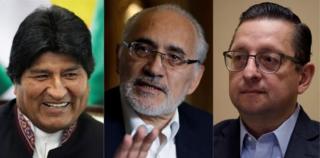Home » Latin America »
Will Bolivians give Evo Morales a fourth term?
Many young Bolivians heading to the polls on Sunday to vote in a general election have no memory of anyone but President Evo Morales leading the Andean nation.
The indigenous politician is running for a fourth term in office and if he wins, he will be in power until 2025.
His critics say he has ignored a referendum in which Bolivians voted to restrict presidents to two terms.
And yet, opinion polls suggest he has a wide lead over his nearest rival.
Who is in the running?
Incumbent Evo Morales is again running for his Movement for Socialism (Mas) party.
13 years, 9 monthsin power
38 yearsleading the coca growers' union
54%of the votes won in 2005 election
64%of the votes won in 2009 election
61%of votes won in 2014 election
Read our profile of Evo Morales: Fourteen years and counting
Mr Morales’ main rival for the presidency is Carlos Mesa, who is running for the Civic Community (Comunidad Ciudadana) political alliance.
19 monthsas president between 2003 and 2005
Came to powerafter the then-president resigned
Journalistwho worked in print and TV
Film buffwho founded the Bolivian Film
Institute
Maritime disputerepresented Bolivia at the International Court of Justice
Third in opinion polls is Senator Óscar Ortiz, who is standing for the “Bolivia dice no” (Bolivia says no) coalition.
8 yearsrepresenting Santa Cruz in the Senate
Businessmanturned conservative politician
14 yearsspent working for Santa Cruz's chamber of commerce
50 years of agehe is the youngest of the top three presidential candidates
How does it work?
Voting is compulsory for adult Bolivians, unless they are over 70 years old. The 7.3 million Bolivians eligible to vote will elect a president and a vice-president, 130 members of the chamber of deputies and 36 senators.
In order to win in the first round on 20 October, a presidential candidate has to either gain more than 50% of the votes, or 40% with a 10-percentage-point lead over his nearest rival.
If no candidate reaches that percentage of votes, a second and final round will be held on 15 December in which the first and second placed candidates will run against each other.
What are the main issues?
Many of those who took part in anti-government protests in the weeks leading up to the election said they opposed President Morales for two reasons: his environmental policies and his disregard for the result of a referendum held in February 2016.
Forest fires which destroyed four million hectares of land in eastern Bolivia made many voters question whether a decree passed by President Morales had contributed to the blazes.
The decree quadrupled the amount of land farmers are allowed to clear for agricultural production.
Many residents of Santa Cruz province, one of the worst affected by the fires, were also angry at the president for refusing to declare a national emergency over the fires.
But the placards and signs many of the protesters held aloft also suggested that anger was still running high about the fact that President Morales bypassed the results of the 2016 referendum on term limits.
A majority of Bolivians voted “no” to Mr Morales’s suggestion to ditch the presidential term limits but Mr Morales’s Mas party took the matter to the constitutional court, which ruled in the president’s favour, allowing him to stand for a fourth consecutive term.
Many voters say that they have not forgiven President Morales for not sticking to his promise that he would respect the outcome of the referendum.
Challenges ahead
However, many indigenous Bolivians who were lifted out of poverty during the time Mr Morales was in power continue to back him for president.
They say Mr Mesa, his main rival, embodies the white Bolivian elite and question his commitment to the poor.
Mr Mesa argues that with oil and gas revenue declining, Bolivia needs to be “more sensible and rational” in the way it spends its money, especially as the country has a fiscal deficit of 7.8% of GDP.
But his message of curtailing spending has not proven popular with poor voters who have seen steady improvements to their quality of life under President Morales.
Mr Ortiz, meanwhile, has asked voters to ignore the opinion polls which have him trailing way behind Mr Morales and Mr Mesa.
At his closing rally, he urged his supporters to cast their vote not for “the old Bolivia” which he claims Mr Mesa and Mr Morales stand for, but for “the Bolivian youth which will guarantee that Bolivia does not return to the past”.
Source: Read Full Article



